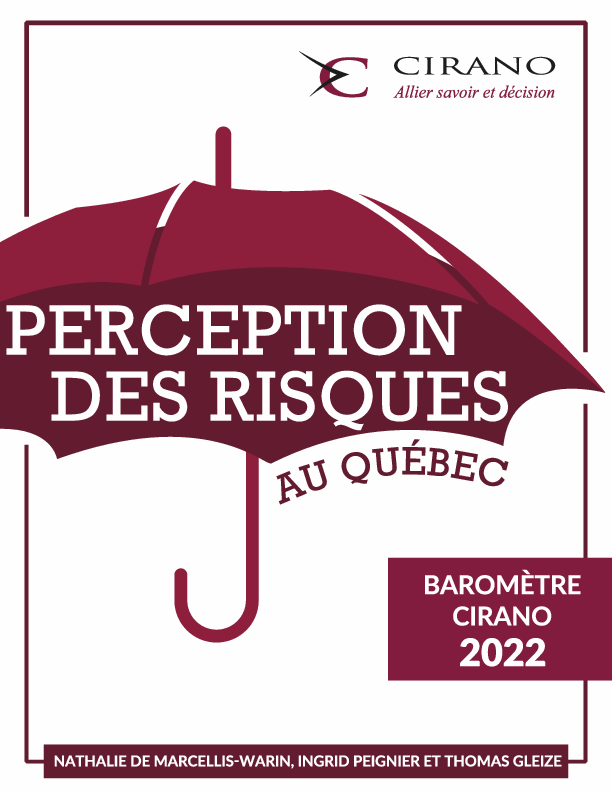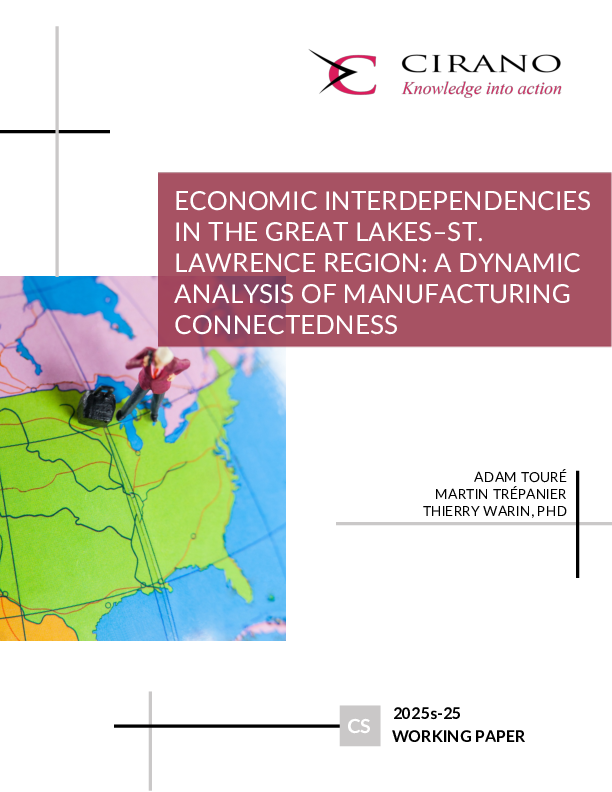BAROMÈTRE CIRANO 2022: La perception des risques au Québec
→ Thematic Supplement - Economics
→ Thematic Supplement - Public Health
→ Thematic supplement - Health system
The 2022 CIRANO Barometer on Risk Perception takes stock of Quebecers' concerns and perceptions on 53 societal issues, such as access to health services and education, climate change, vaccination, data sharing, the public debt, the rising cost of living, real estate, and major energy projects.
The 2022 edition of the CIRANO Barometer focuses on the results of the survey administered online from June 28 to July 4, 2022 to a sample of 1000 respondents, representative of the Quebec population. This latest survey was conducted at a time when Quebec is experiencing a higher level of inflation than over the past 30 years, but also against the backdrop of a war in Ukraine with all the destabilizing effects that follow, such as the rise in energy prices reflected in inflation or the feverishness of financial markets. The concerns of Quebecers presented in this report reflect this context. In addition, although the majority of health restrictions have been lifted in recent months, the year 2022 marks a continuation of the COVID-19 pandemic, with the number of deaths in September 2022 already higher than in 2021. The economic consequences of the pandemic are now also strongly felt through the slowdown of supply chains and labor shortages.
Throughout their analyses, the authors have kept in mind the human and economic consequences of this uncertain environment, which of course influence Quebecers' perceptions. Thus, while it's important to highlight the differences in perceptions between 2022 and 2021, we also looked at the changes between 2018, the last pre-pandemic survey, and 2022.
The CIRANO 2022 Barometer is extremely dense in terms of information of all kinds and paints a fairly evocative picture of Quebecers' priorities. Here are the most outstanding facts.
For the first time since the first CIRANO Barometer collect in 2011, economic and financial issues have taken the lead among Quebecers' personal concerns, thus overtaking issues related to the healthcare system.
In each edition of the CIRANO Barometer, respondents are asked to identify their top two personal and collective concerns from a list of ten major issues, including health, the environment, the economy, industrial risks, innovation, infrastructure, public projects, and security.
Although the top three personal concerns remain the same since 2011, their ranking is different for the first time this year:
- 49% of Quebecers chose economic and financial risks in their top two concerns, up 10 points from 2021.
- Health care risks are next, with 47%, up 5 points.
- Environmental and energy-related risks are among the top two concerns of 29% of Quebecers, down 4 points from 2021. This relative decline is directly related to the very clear and strong increase in perceived risks for economic and financial issues and for issues related to the health care system.
Collectively, the same three issues top the list, but in this case, risks related to the health care system come before economic and financial issues: 45% of Quebecers chose health care as their top two concerns for Quebec (up 4 points from 2021) and 32% chose the economy (up 14 points).
The increase in concern between 2021 and 2022 for economic issues coincides with a period of significant economic and financial uncertainty for Quebec, manifested in a loss of purchasing power, among other things.
Different concerns by region, gender and age
On a personal level, residents of the Montreal metropolitan region are less concerned than residents of other regions (outside the Quebec metropolitan region) about economic and financial risks (43% vs. 55%) and natural hazards. On the other hand, they are more concerned about safety than residents of other regions, both collectively and personally (15% for Montreal residents versus 8% for residents of other regions).
Residents of the Quebec City metropolitan area are the most concerned, both personally and collectively, about risks related to transportation infrastructure. In particular, 36% of residents of the Quebec City RMR are concerned about risks related to transportation infrastructure, compared to 15% of residents of the Montreal RMR and 13% of residents of other regions.
Women are more personally concerned than men about risks related to the health care system (51% vs. 42% of men) and public health risks (28% vs. 21% of men). Respondents over the age of 55 are more concerned about health system risks at a personal level. In contrast, for economic and financial risks, those under 35 are the most concerned, both personally and collectively.
While emergency room overcrowding is still among the top three perceived risks in 2022, two new economic issues are in the top three for the first time this year: the rising cost of living and the price of gasoline
85% of Quebecers perceive the rising cost of living and interest rates as a big or very big risk (+21 points compared to 2021) and 82% perceive the price of energy (gasoline) as a big or very big risk (+23 points compared to 2021). Among the issues perceived as very risky, the majority are socio-economic and public finance issues, or issues related to the health care system.
Moreover, the average risk levels perceived in 2022 for the two issues related to the healthcare system are the highest of all previous editions of the CIRANO Barometer and are back to their 2011 level: 83% of Quebecers perceive high risks for emergency room overcrowding and 77% for access to healthcare services. On the other hand, confidence in issues related to the health care system is better overall in 2022 than in all CIRANO Barometer editions since 2011 (and better than in 2018, the closest pre-pandemic year), except in 2021. Marked by COVID-19, 2021 had been a year in which all levels of confidence, regardless of the stakes, were much higher than in any previous edition.
Climate change is no longer among the three issues perceived as most risky this year as it was in 2021, but the average level of perceived risk remains very high and significantly higher than in 2018.
Vaccination, energy production from wind or solar sources, and immigration are the three issues for which the public's social acceptability is strongest
More than three quarters of the population say they are very or somewhat in favor of these three issues. While the pandemic context has led to an increase in the perceived risk associated with vaccination, the population seems to have measured the extent of the collective benefits related to this issue, since social acceptability of vaccination has never been as high as it has been in the last two editions of the Barometer.
Quebecers are very consistent in their responses: for all the issues for which they are opposed, the level of perceived risk is higher than the level of perceived benefit and the level of confidence is relatively low. Conversely, for all issues for which they are in favour, the perceived benefits are greater than the perceived risks and confidence is higher.
The pandemic has undoubtedly exacerbated some concerns, and perceived risks and confidence in government to manage certain issues often boomerang between 2018 and 2022
Strictly comparing 2021 data with 2022 data can hide the real evolution of perceptions. Indeed, Quebec was in the middle of a pandemic in the 2021 edition of the Barometer and in this context, certain concerns are often exacerbated. Although there was a decrease in overall confidence between 2021 and 2022, it seems that in 2022, as we seem to be emerging from the pandemic, the level of confidence has returned to the level of 2018, or even improved, depending on the issues.
With regard to perceived risk, certain perceptions have been confirmed over time, especially for economic issues: the upward trend that began in 2018 has continued into 2022. On the other hand, a "boomerang" effect is most often observed for perceptions. For health-related issues, there was a decline in the level of perceived risk between 2018 and 2021 and then risk increased in 2022, reaching generally higher levels of risk than in 2018. Regarding trust in government, after improving between 2018 and 2021 for health and economic issues, it has declined this year and is back to near the pre-pandemic level of 2018.
A need to improve Quebecers' economic literacy
Those who don't know how to assess the level of risk for household debt are almost 7 times more likely to be concerned about economic and financial risks. This result and other perceptions of the Barometer related to economic issues indicate a need to improve the economic literacy of Quebecers. The source of information used is also critical in this context. For example, those who get a lot of information from governments are about half as likely to be concerned about economic and financial risks.




